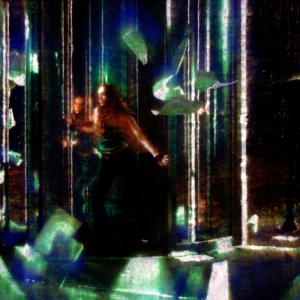BIO:
John Milton was born in London in 1608 (seven and a half years before the death of Shakespeare). His grandfather was a Roman Catholic who had disowned Milton's father when the latter turned Protestant. The boy was sent to St. Paul's school, perhaps when twelve, perhaps earlier. From the beginning, Milton was an eager student (he tells us that from the time he was twelve, he seldom stopped reading before midnight), and he learned Latin, Greek, and Hebrew, and began to try to write verse. In 1625 he enrolled at Christ's College, Cambridge, clashed with his tutor the following year and was suspended, returned and was given another tutor, and graduated on schedule. The University in those days still undertook to teach largely by rote memorization, and Milton thought his training there of little value. He undertook to give himself a liberal education by wide reading. His father had hoped to make a lawyer of him, but took it very well when his son announced that he intended to make the writing of poetry his life's work.
In 1629 (when he was 21 years old) he wrote a short poem, "On the morning of Christ's Nativity," his first memorable work, still widely read at Christmas.
A few years later, he wrote a masque (or mask), which was presented in 1634, at Ludlow Castle, near the Welsh border, in honor of the Earl of Bridgewater.
In August 1637, a classmate of Milton's, Edward King, who had written some poetry himself, was drowned, and several of his friends resolved to write poems in his memory and publish a collection of them. Milton was asked to contribute. His poem was called Lycidas.
Between 1641 and 1660, Milton wrote almost no poetry. This was the time when the English Puritans were setting out to overthrow the English monarchy on the grounds that it was levying taxes unlawfully (and was, moreover, in league with the wicked English Church), and to overthrow the English Church on the grounds that, while nominally breaking with Rome, it had retained many Romish customs, such as white gowns for the clergy (instead of the black gowns worn by Puritan clergy, which were obviously more seemly) and that the English Church was therefore just as bad as the Church or Rome (and was, moreover, in league with the wicked English monarchy). Milton believed wholeheartedly in the Puritan cause, and set aside his poetry to write pamphlets in defense of various aspects of liberty as he saw it.
One work that Milton wrote but never published was a theological treatise called De Doctrina Christiana ("On Christian Doctrine"). It is for the most part straightforward Protestant theology, but includes some departures from the mainstream position, and Milton carefully labels them as such. First, and most seriously, Milton was an Arian. That is, he believed that the Father exists eternally, and that He begat the Son (and "before he was begotten, he was not"), and that the Son then created the physical universe. Thus, the Son is far from being a mere human. He is the second greatest of all things. But he is not co-equal and co-eternal with the Father, and is not, in the fullest sense, God. Since the publication of the Doctrina in 1825, critics have looked for indications of heretical beliefs in Milton's Paradise Lost and other published works. Such indications, if they are there, are few, minor, obscure, and doubtful. It is not even certain that Arianism was Milton's settled view. A man writing a paper for his own eyes, to clarify or examine his views, may very well set forth in it the case for a position that he does not hold, simply to see what can be said for it.
In 1642, at the age of 33, Milton married Mary Powell, a girl of 16 from a royalist family. Her family had been large and sociable. Milton's was small and studious. In a few months, she went home to her family. Milton reacted by writing a treatise, "On the Doctrine and Discipline of Divorce," in which he argued that incompatibility of temperament and personality was a sufficient reason for dissolving a marriage. Both Royalists and Puritans found the idea disgraceful, and the pamphlet had no discernible effect in Milton's day. However, it is noteworthy for the importance that Milton here attaches to friendship and companionship and the meeting of minds (as opposed to the mere meeting of bodies) as an essential ingredient in a successful marriage. In 1645 friends brought about a reconciliation, and Mary returned to her husband. In 1646, when the Civil War had gone against the Royalists and the Powells were homeless, he took the ten of them into his own home for a year. Mary bore John three daughters, and died in 1652.
In 1644, Milton published two pamphlets much admired today. The first was called "Of Education," and outlines a course of study for producing an enlightened citizenry. Studies are to include the Bible, the classics, and science. He also published in 1644 his most famous pamphlet, Areopagetica (air-ee-opp-a-JET-i-ca). Those who have read the Book of Acts in the King James translation will remember that while in Athens, Paul is said to have preached on Mars' Hill. In fact, he spoke before the Areopagus, a council of citizens that got its name from its meeting place, a temple of Ares (or Mars), and that was responsible for censorship and the safeguarding of public morals. Milton's pamphlet was written in protest against the setting up by the Cromwell government of a board of Censorship for all printed works. It is an eloquent and forceful argument for freedom of the press. Every college library or large public library will normally have a copy, and most large bookstores will have a paperback copy or be able to order one.
Milton's dismay on finding that the new revolutionary government, undertaken in the name of liberty, could be just as intolerant of dissent as the monarchy it replaced, found expression not only in the "Areopagetica," but also in poetry. He wrote a 24-line poem titled, "On the new forcers of Conscience under the Long Parliament," ending with the line, "New Presbyter is but Old Priest writ Large."
In February 1649, just after the beheading of King Charles I, Milton published a pamphlet called "the Tenure of Kings and Magistrates," arguing that power resides in the people, who may give it to governors, but are free to withdraw it again. He was invited to become Secretary for Foreign Languages in Cromwell's Council of State. As such, he continued to write pamphlets defending the Republic, the killing of the King, and the rule of Cromwell. He was no mere server of those in power. He was still publishing a month before Charles II was brought back from exile to take the throne, at a time when it must have been obvious that the cause was lost, when every consideration of personal safety demanded that he adopt a policy of silence, if not of outright reversal of position.
After 1660, with the monarchy restored, Milton's political dreams lay in ruins under the double blow of the collapse of the Puritan Republic and the failure of said republic to uphold freedom while it lasted. Milton retired to private life and returned to his true vocation, the writing of poetry. He had gone blind while serving as secretary to Cromwell, and now sat composing his poems in his head, and dictating each day to his daughters the portion that he had composed. It was in this retirement that he produced his three long poems, Paradise Lost, Paradise Regained, and Samson Agonistes. He died 8 November 1674.
So much for a summary of Milton's life. Now for comments on some of his poems.
Paradise Lost: Milton's Long Epic
By far his best-known poem is Paradise Lost, an epic in twelve books in the tradition of Virgil's Aeneid, recounting the story of Satan's rebellion against God, and of the disobedience and fall of Adam and Eve, led astray by Satan's lies. The story of Satan's rebellion is not found in the Bible, except in passing allusions capable of more than one interpretation. I will therefore pause to sketch the story as it was generally accepted in Milton's day.
Satan, originally called Lucifer ("light-bearer") was one of the greatest of the angelic beings who serve God in Heaven. However, every created being with intellect and will has a choice whether to put God first or to put himself first, and Satan chose to put himself first. He was not content to be a subordinate. He proposed to be equal to the Most High. (See Isaiah 14:12-15, a passage which probably refers to the King of Babylon (see verse 3), but which has often been applied to Satan.) He rebelled against God, and persuaded one third of the angels to join him. (The number is based on Revelation 12:4, where a dragon is said to draw one third of the stars out of heaven. If we take the dragon to be Satan, and the stars to be angels, we get the result. However, there are numerous references on the book of Revelation to the destruction of one third of something or other, and it is arguable that this is a conventional poetic expression rather than a statistic.) In Milton's account (I am not sure whether this particular idea is Milton's own invention), the event that rouses Satan to rebellion is God's proclamation of His only Son as the ruler of all created things, to whom all angels and the whole universe must pay homage. God says in this connection:
This day have I begot whom I declare,
My only Son....
This is a quotation from Psalm 2:7, which in some manuscripts is quoted in connection with the Baptism of Christ. If we take "beget" as "bring into existence," this would mean that the Son is created after the angels, which is nonsense, since Milton makes it explicit that it is only through the Son that the angels and all other things are created (John 1:3). However, the Hebrew verb "yalad", translated "beget", also has the meaning of "to publicly acknowledge as one's heir." Thus, when we are told (Genesis 50:23) that Joseph's great-grandchildren were begotten on Joseph's knees, this does not mean what you are thinking. It means that soon after the child was born, Joseph, in his capacity as head of the family, took the child on his knees and accepted it before witnesses as a member of the family.
So, God the Father proclaims the glory of the Son and commands all the angels to worship Him (see Hebrews 1:6). At this Satan rebels, and leads other angels into rebellion with him. They fight against the loyal angels, led by Michael, and are defeated and cast out of Heaven (see Revelation 12:7-9). Satan, who has heard rumors that God intends to create a race of humans, then plots to obtain his revenge by destroying their happiness and their delighted obedience to God. And the rest of the story is found in Genesis chapters 2 and 3, except that these chapters make no mention of Satan, and say simply that the sepent deceived Eve. Milton tells us that the serpent was really Satan disguised as a serpent.
The modern reader of this poem is likely to run into two general sorts of difficulties.
First, he may not understand what sort of poem Milton is writing, or the basic ideas underlying the poem. For this, the best remedy I know is the book, A Preface to Paradise Lost, by C S Lewis. It is available in hardback and in paperback (Oxford University Press), and should be in any large library. I suggest reading it before reading the poem, or after reading the poem, or sandwiched between sessions of reading the poem. In addition to discussing the literary background of the poem, its roots in Homer and Virgil and in Beowulf, the reasons for the style of the poem, and so on, Lewis discusses the character of Satan, the implications of his choice, and so on. It is a valuable antidote to the work of many modern critics who say that Satan is the real hero of the poem, and that he deserves our admiration (and had Milton's) for rebelling against the "establishment."
Second, the reader may find himself bewildered by the many references and allusions that Milton throws out. If your copy of Milton has footnotes explaining all the references, fine. If it doesn't, just keep reading and don't worry about them. For example, in line 15 of the poem, Milton tells us that his epic will soar "above the Aonian Mount." If you have a profusely footnoted edition, you will be told that this mount is Helicon, in Boetia, a mountain sacred to the Muses and therefore a symbol of poetic inspiration. If you do not have any footnotes, and do not already know about Helicon, there is really no problem. You gather from the context that Milton means that he is promising you a first-rate poem, a poem that will fly, a poem that will lift your imagination to behold great things. And, as you read on, you will find that he keeps his promise.
|
 Holly Humberstone Collaborates with Medium Build and Tiny Habits on Reimagined Versions of Her Songs
Holly Humberstone Collaborates with Medium Build and Tiny Habits on Reimagined Versions of Her Songs
 Yungblud Releases Cover Of Kiss Classic 'I Was Made For Lovin' You' From THE FALL GUY
Yungblud Releases Cover Of Kiss Classic 'I Was Made For Lovin' You' From THE FALL GUY
 OYSTERBAND Extends 'A Long Long Goodbye' Tour
OYSTERBAND Extends 'A Long Long Goodbye' Tour
 Flung Shares New Single 'Misty'
Flung Shares New Single 'Misty'
 Yungblud Releases 'Abyss'; Track Serves As The Opening Theme For Upcoming Anime Series, 'Kaiju No. 8'
Yungblud Releases 'Abyss'; Track Serves As The Opening Theme For Upcoming Anime Series, 'Kaiju No. 8'
 Holly Humberstone Unveils Her 'Work In Progress' EP
Holly Humberstone Unveils Her 'Work In Progress' EP
 Mannequin Pussy Drop New Album 'I Got Heaven'
Mannequin Pussy Drop New Album 'I Got Heaven'
 Holly Humberstone Shares Details On 'Work In Progress' EP To Be Released In March
Holly Humberstone Shares Details On 'Work In Progress' EP To Be Released In March


